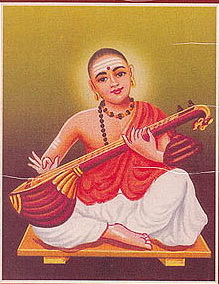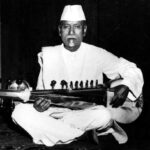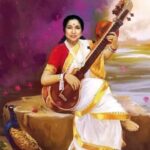Muthuswami Dikshitar: The Timeless Musical Genius Who Shaped Carnatic Music
Introduction
Muthuswami Dikshitar (1775–1835) is one of the most revered composers in the Carnatic music tradition. His compositions are deeply spiritual, intellectually profound, and musically intricate. Alongside Tyagaraja and Syama Sastri, he forms the Trinity of Carnatic Music. His works have had a lasting impact on Indian classical music and continue to inspire musicians worldwide.
Early Life and Background
Muthuswami Dikshitar was born in Tiruvarur, Tamil Nadu, into a family of scholars and musicians. His father, Ramaswami Dikshitar, was a distinguished musician and an expert in Vedic traditions. From an early age, Muthuswami displayed an exceptional grasp of Sanskrit, Tamil, and music. He was sent to Varanasi (Kashi) to study under Chidambaranatha Yogi, where he mastered Hindustani music and Dhrupad style, which later influenced his compositions.
Daily Life and Lifestyle
Dikshitar led a disciplined and spiritually enriched life. His daily routine revolved around:
- Morning Prayers and Meditation – He began his day with rigorous spiritual practices.
- Composing Music – Many of his kritis were composed spontaneously, inspired by deities and temple visits.
- Teaching Disciples – He imparted his musical knowledge to students, shaping future generations of Carnatic musicians.
- Observing Religious Rituals – His compositions were often based on the experiences he had in temples.
Musical Contributions and Significance
Muthuswami Dikshitar composed over 450 kritis, many in Sanskrit, and in the Mela Karta ragas. His compositions are unique due to their structured approach, lyrical beauty, and the integration of both Carnatic and Hindustani influences. Some key features of his music include:
- Use of Sanskrit Language – Unlike Tyagaraja, who wrote in Telugu, Dikshitar composed mostly in Sanskrit.
- Raga Exploration – He introduced and developed many ragas, such as Raga Sankarabharanam, Kalyani, and Kambhoji.
- Incorporation of Western Notes – He was one of the first to experiment with Western musical influences, evident in his Nottuswara compositions.
- Devotional Depth – His songs were deeply rooted in bhakti (devotion) and were dedicated to various deities.
Historical Impact and Influence on Society
Dikshitar’s music was not just artistic; it played a crucial role in preserving and spreading Hindu religious philosophy. His compositions served as:
- A medium of spiritual awakening – His songs helped devotees connect with divine consciousness.
- A preservation of temple culture – Many of his kritis describe temple deities, architecture, and rituals.
- An inspiration for future musicians – Legends like Semmangudi Srinivasa Iyer and M. S. Subbulakshmi have performed his compositions extensively.
Interesting Facts About Muthuswami Dikshitar
- He composed songs for Navagrahas (nine planets), believed to have astrological significance.
- His signature in compositions was “Guruguha,” a reference to Lord Subramanya, his family deity.
- His “Nottuswara” kritis were influenced by British band music.
- His last composition was “Meenakshi Me Mudam”, dedicated to Goddess Meenakshi.
- He is believed to have attained samadhi while singing his own composition on Goddess Meenakshi.
Observance and Celebration of His Legacy
Muthuswami Dikshitar’s contribution to Indian classical music is celebrated through various festivals and concerts:
- Annual Music Festivals – Many temples and institutions organize festivals featuring his compositions.
- Dedicated Workshops and Lectures – These help students and musicians understand his musical techniques.
- Online and International Recognition – His compositions are studied globally by classical musicians.
Importance to Society
Dikshitar’s legacy extends beyond music into philosophy, culture, and education:
- He preserved classical traditions during British colonial rule.
- His compositions are therapeutic and used in music therapy.
- He emphasized spirituality and self-discipline in daily life.
Wishing and Honoring His Contribution
On occasions like Dikshitar Jayanti, musicians and devotees pay tribute to his timeless legacy by performing his kritis. His compositions remain an integral part of Carnatic music concerts and serve as a bridge between spirituality and music.
Final Thoughts
Muthuswami Dikshitar’s music is not just an art form but a spiritual journey. His compositions, filled with deep devotion, musical brilliance, and cultural significance, continue to resonate with audiences worldwide. Whether you are a music lover, a scholar, or a devotee, his kritis offer an enriching experience that transcends time.
Muthuswami Dikshitar’s legacy continues to thrive, making him a timeless icon in Indian classical music. His compositions remain a guiding light for musicians and spiritual seekers alike!










